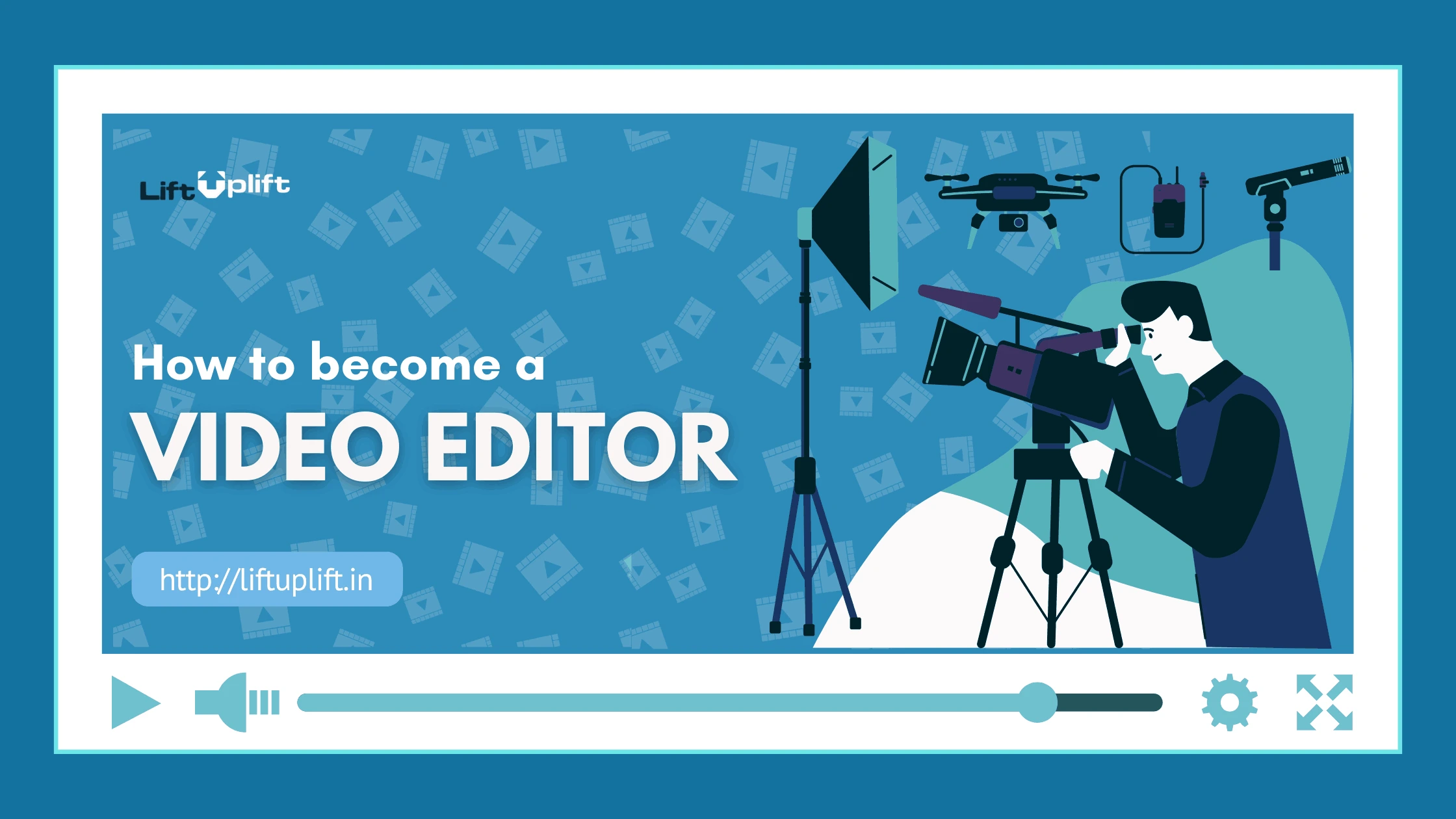Have you ever been curious about how these great videos on YouTube, Instagram, or even on the news are made? Behind it all, a professional video editor pieces together the full footage into great, neatly polished content. Whether you aspire to be the next Spielberg, or you just love stories, learning how to become a video editor can bring you lots of creative opportunities.
Master video editing through this step-by-step journey! Let’s learn what its basic concepts are, hone our skills, and put ourselves on the right career path. Are you ready? So, let’s get into this and go all the way to explore the incredible world of video editing!
Who is a Video Editor?
A video editor is responsible for putting together recorded raw material in a workable product for broadcast. Therefore, he or she identifies or chooses which shots are supposed to be included in the assembly, adds effects, and makes sure that the final cut flows well. Video editors work on different projects – films, television shows, ads, and online content. They want to produce an engaging story that will stick to the minds of the viewers while glued to the screen.
Knowing a little idea about what a video editor does, let’s dive into how to become a video editor.
Step by Step Guide on How to Become a Video Editor
Being a video editor is not easy, but becoming one is easy. To do so, just follow these steps. Here’s a simple guide that will help you find your way:
Step 1: Familiarize Yourself with Basic Video Editing Principles
Start by learning basic video editing concepts. There are many tutorials available online or you can read guides on the fundamental concepts on how to learn editing.
Step 2: Choose Your Editing Software
Video editing application. Opt for the one that suits you best. You can either opt for Adobe Premiere Pro, Final Cut Pro, or DaVinci Resolve; many of these offer free trials so that you might try them.
Step 3: Learn the editing techniques
There are always many video editing skills. These include cutting, trimming, insertion of transitions, and some sound effects. One can use online courses and YouTube tutorials when looking for good source material.
Step 4: Practice Regularly
The more you practice, the better you will become. Start with small projects, like editing your personal videos or content for social media.
Step 5: Build a Portfolio
As a seasoned professional, compile your best work into a portfolio. That way, you will display your potential to a potential employer or client.
Step 6: Network
Network with other video editors and industry professionals. Engage with online forums, workshops, and local events.
Step 7: Applying for Jobs
Then, you should look for video editing jobs from home that can be done from home or even in a studio. Countless web resources include Upwork and LinkedIn, so you can find freelance and full-time jobs through them.
Step 8: Consider Formal Education
Although this is not a requirement, furthering education in video editing skills is highly recommended. Most institutions of learning nowadays offer courses ranging from the technical to the creative realms of video editing.
Step 9: Stay Updated
The video editing landscape is constantly evolving. You would need to know the latest trends, software updates, and techniques that can make you relevant in this business.
All these steps are a sure start to becoming a video editor. Let’s now discuss the skills and qualifications you will need in the field.
Skills and Qualifications
To be an excellent video editor, one needs to possess a certain set of skills–
- Proficiency in video editing software, such as Adobe Premiere Pro or Final Cut Pro
- Good understanding of detail
- Ability to tell good stories through video
- Knowledge of video production and post-production processes
- Ability to work under pressure
- Creative and artistic vision
- Effective communication
- Knowledge of sound design and music editing.
Other than those skills, some video editor qualifications can further make you qualified to be employed. Employers sometimes look for persons with a degree in video editing or a person who has gained relevant experience in the field.
Knowing the skills required to become a video editor you will enable you to better prepare for job applications.
Now that you know what to expect in terms of skills and qualifications, let’s talk about earning potential in this field.
Types of Video Editing Degrees
There are also degrees of video editing, which vary according to the depth in which you want to be involved in the field:
1. Diploma in Video Editing
A diploma in video editing generally lasts from 6 months to 1 year. These courses are usually for people who want to get into the world of video editing right quickly. It’s those people who want to know the basics, like video editor requirements, what editing software does, what transitions do for a video, or what simple effects can be achieved.
2. Bachelor’s Degree in Film and Video Editing
A Bachelor’s is the most comprehensive video editing degree you can get. Usually, these degrees fall in the bigger programs, like Bachelor of Fine Arts, or Bachelor of Arts, in Film, Television, or even Media Studies. You will not only learn video editing but also film theory, direction, and cinematography.
3. Master’s in Post-Production
A master’s in post-production or film editing will help one specialize more, depending on the course, which is more research-based. Many aspects of post-production can be explored deeply: visual effects, color grading, and sound design.
Top Colleges and Universities Offering Video Editing Degrees
Well, so finally you have decided that video editing is your field of study? Now, the time has come to select a college or university. Well, so here is the list of some of the top institutions offering courses in video editing:
1. Film and Television Institute of India, Pune
FTII is one of the best film institutes in India. This institute provides professional film editing courses and gives you enough exposure to get established as a successful filmmaker in the film or television industry of Bollywood.
2. Satyajit Ray Film and Television Institute (SRFTI), Kolkata
One of the best film institutes in India, SRFTI provides full-fledged editing degrees including hands-on experience in several sectors of filmmaking.
3. Whistling Woods International, Mumbai
Located right at the heart of Bollywood, Whistling Woods International is offering diploma and degree programs in video editing in great demand from aspirants wanting to enter the Indian film industry.
4. National Institute of Design (NID), Ahmedabad
NID offers a range of media-orientated courses that include video editing. Famous for new-age technology, its design-oriented approach sets it apart.
Salary of Video Editor
The salary of video editors varies considerably due to the high dependence of these positions on experience, location, and several projects worked. The below table gives the breakdown of video editor salary and job description.
| Job Title | Salary Range | Job Description |
| Video Editor | ₹3.0 Lakhs – ₹6.0 Lakhs | It will essentially comprise of basic editing, cutting of footages, transition addition, and basic audio readjustments. This is thus suited for beginners to gain experience with video editing. |
| Senior Video Editor | ₹5.0 Lakhs – ₹9.0 Lakhs | More comprehensive work is done in editing. He or she works hand in hand with the director and producer, including color grading, sound editing, and graphics embedding. |
| Lead Video Editor | ₹3.0 Lakhs – ₹6.0 Lakhs | Lead editing projects, with some mentoring of junior editors, and ensure deliverables are of the highest quality. Be someone who has significant experience and strong skills in editing applications. |
| Freelance Video Editor | ₹4.0 Lakhs – ₹7.0 Lakhs | Much of the work is project-based and are usually video editing jobs from home. Responsibilities will vary significantly due to the varying needs of clients. For example, there may be video editing for promotional content, general content for social media, or something much more. |
| Video Editor in Advertising | ₹5.0 Lakhs – ₹9.0 Lakhs | Creates great ads, involves the creation of awareness-oriented content, therefore marketing and audience engagement. |
| Video Editor in Film Production | ₹3.0 Lakhs – ₹13.0 Lakhs | Creates feature films that have to have collaborated with directors and producers to come up with one coherent storytelling element through editing. This most of the time is combined with tight deadlines and long hours. |
Wrapping up
If you feel a passion for the art of telling through pictures and want to put forth some effort to learn, then the path to a career in video editing could indeed be the most rewarding. Follow the steps above and hone these skills, and navigating your journey within the world of video editing will be successful. If you want to work at home on video editing jobs or in a studio anything is possible and highly abundant.
Remember that the most important skill in becoming a full-fledged video editor is constant learning and practice. Well, let’s embark on a journey of how to become a video editor!
Frequently Asked Questions
1. How long does it take to become a proficient video editor?
That depends on your learning pace and drive. For someone who has never edited anything in their life, it will take roughly 6 months to a year to get comfortable with the basics.
2. Is the degree important for effective video editing?
No. You do not need to have a degree to become a good video editor; it will merely provide you with a structured environment in which to learn and will open up avenues for networking with fellow individuals.
3. Which video editing software should I start with if I am a beginner?
The three most popular ones include Adobe Premiere Pro, Final Cut Pro, and DaVinci Resolve.




